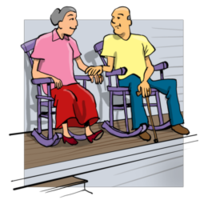Successful Aging

One of the most promising changes in psychology is the ever-greater emphasis on what makes us healthy, rather than constantly looking at the things that make us sick. There is an important approach called Behavioral Activation (BA) Theory, which emphasizes environmental and behavioral factors as determinants of our overall well-being. According to the theory, reduced engagement in pleasurable activities may be an important precursor of reduced well-being. This makes good sense: it is estimated that as much as 90% of our higher cortical functions are designed for social interactions.
This is something that I wrote in Healing, Meaning and Purpose:
“Nothing in the Universe exists in isolation: We live in a Universe of relationships. It is inconceivable that anything can exist except in relationship to something else. The entire Universe is made up of integrated systems that function, develop and evolve together. A failure to construct and maintain healthy relationships can be a cause of much distress.
Several years ago I reported some interesting observations. At the time, I was doing a lot of research on diseases of blood vessels. I had developed a laboratory method for taking some of the cells that line blood vessels from volunteers and then growing them in a cell culture dish. We discovered that if we did not have enough cells in the dish, they would all die of “loneliness.” The exception is cancer cells, which in culture will grow on their own, like weeds.”
As an example in a paper published in February in the Archives of General Psychiatry it was shown that lonely individuals may be twice as likely to develop the type of dementia linked to Alzheimer’s disease in late life as those who are not lonely. The theory has been shown to predict psychiatric well-being in a number of populations, including the caregivers of people with Alzheimer’s disease, people with chronic pain, cancer patients and community-dwelling older people.
It is also known that psychiatric well-being, particularly emotional well-being, may play an important role in cardiovascular health. This may be due to an increase in the activity of the sympathetic nervous system that increases not only blood pressure, but also the levels of inflammatory mediators and coagulant factors in the blood.
In research from the University of California at La Jolla that was presented on Monday at the 2007 Annual Meeting of the American Psychiatric Association in San Diego, California, twenty two people with a mean age of 70 were studied, to see if there was a link between their behavioral activation, i.e. how satisfied they were with their leisure activities, their affective well-being and their blood pressure.
The findings were as expected: the less satisfied and engaged people were, the higher was their blood pressure.
This is only preliminary data, but it confirms something that we have said before: as we get older it is as important to stay socially engaged as it is to do mental exercise.
And if you known someone who is older and isolated, you might want to go and see them.
“The most terrible poverty is loneliness and the feeling of being unloved.”
–Mother Teresa of Calcutta (Albanian-born Indian Nun, Humanitarian and, in 1979, Winner of the Nobel Peace Prize, 1910-1997)
“What makes loneliness an anguish is not that I have no one to share my burden, but this: I have only my own burden to bear.”
–Dag Hammarskjöld (Swedish Statesman, Secretary-General of the United Nations from 1953-1961, and, in 1961, Winner of the Nobel Peace Prize, 1905-1961)






